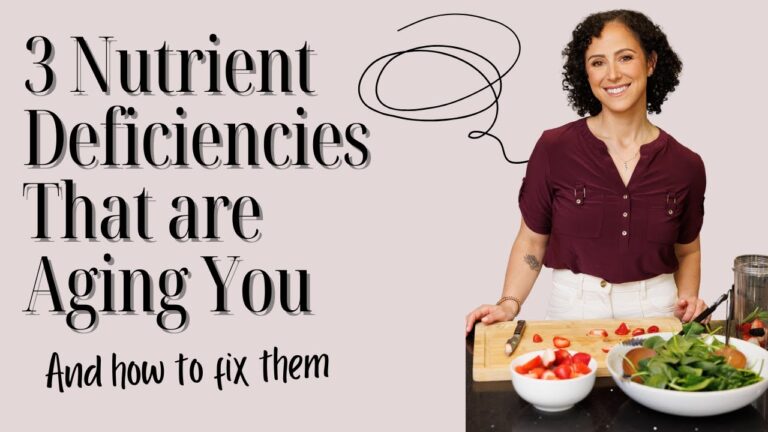Do you ever feel like you’re aging faster than you should—even though you’re trying to eat healthy and stay active?
You’re not alone. What if I told you that some of what you’re feeling—fatigue, brain fog, achy joints—might not be aging at all? It could actually be your body whispering (or maybe shouting) that it’s missing something it really needs.
In this post—and in my latest video—I break down three of the most common nutrient deficiencies and aging symptoms that no one talks about enough. These sneaky deficiencies often go undiagnosed and can mimic everything from dementia to depression to brittle bones. The good news? With the right support, you can fix them—and start feeling like yourself again.
I’m Arielle Creager, a certified nutrition specialist candidate, personal trainer, and your cheerleader in all things health, strength, and vitality. My mission is to make healthy living feel simple, supportive, and totally doable at any age. So, let’s walk through what these silent nutrient gaps are, how they accelerate aging, and what you can do—starting today—to take control.
The 3 Nutrient Deficiencies Aging You Faster (and How to Fix Them)
1. Vitamin D — The Sunshine You’re Probably Not Getting Enough Of
We’ve all heard that vitamin D is important, but did you know your body becomes up to four times less effective at producing it from sunlight as you age?
Vitamin D is crucial for bone strength, immune support, brain function, and mood. A deficiency doesn’t just make you tired or achy—it can quietly increase your risk for osteoporosis, depression, and even cognitive decline.
What to do:
Get outside, yes—but know that it’s probably not enough
Consider a high-quality vitamin D3 supplement, especially if you live in northern climates or wear sunscreen (which is still a good thing!)
Most older adults do well with 1,000 to 2,000 IU per day, but always check with your doctor
Remember, vitamin D helps your body absorb calcium—so it’s doing double duty for your bones and your overall vitality.
2. Vitamin B12 — The Brain-Boosting Powerhouse You May Not Absorb Well
B12 plays a major role in energy, memory, nerve health, and mood. But here’s the problem: as we age, our stomach acid production declines, which means we absorb less B12 from food—even if we’re eating well.
To make matters more complicated, many common medications (like antacids, metformin, or birth control) can make absorption even harder.
What to do:
Ask your doctor to check your B12 levels, especially if you’re feeling fatigued or forgetful
Use a sublingual B12 or B-complex supplement (great if you’re vegan or not eating much animal protein)
In some cases, B12 injections may be necessary—especially if absorption is impaired
This is one of those deficiencies that can look like early dementia or depression—and is often totally fixable.
3. Calcium — The Underrated Essential for Women Over 50
Yes, calcium builds strong bones, but it also supports muscle movement, nerve signaling, and even heart rhythm. Many older adults—especially postmenopausal women—aren’t getting nearly enough.
The result? Over time, this deficiency quietly eats away at bone density, increasing the risk of fractures and osteoporosis. And because calcium doesn’t always show up clearly on blood tests, most people don’t realize it’s low until they break something.
What to do:
Eat calcium-rich foods like leafy greens, almonds, canned fish with bones, and dairy (if tolerated)
Aim for about 1,200 mg per day—talk to your doctor about tracking it
Consider a calcium citrate supplement if you’re not getting enough from food
Pair it with vitamin D to help your body absorb and use it effectively
This isn’t just about bone health—it’s about staying active, independent, and vibrant as you age.
When Food Isn’t Enough (and That’s Okay)
Here’s something I want you to hear loud and clear: you are not failing if you need supplements.
As we age, our ability to extract everything we need from food gets harder—especially if you’re taking medications, eating less, or dealing with chronic conditions.
Supplementing smartly and intentionally can make all the difference.
My rule of thumb?
Start with food
Use lab results and symptoms to guide your choices
Choose high-quality, bioavailable supplements
Work with a provider who listens, supports, and never shames you
If you’re looking for guidance, I have a simple cheat sheet with the top supplements I recommend to my older clients—and I’d be happy to send it to you.
Let’s Recap What We’ve Learned
Vitamin D declines naturally with age, and it supports bone, immune, and brain health
Vitamin B12 is harder to absorb over time, but critical for energy and cognitive function
Calcium does much more than build bones—it keeps your body functioning from head to toe
If you’ve been feeling off, low energy, or like your body’s aging faster than your spirit is ready for—look deeper. Sometimes, the solution is simpler than you think.
👉 Watch the full video now to learn how to fix these silent deficiencies and start feeling strong, energized, and confident again.
Drop the word “supplements” in the comments on YouTube, or send me an email if you’d like my cheat sheet.
You’re not just aging—you’re evolving. Let’s support your body every step of the way.



